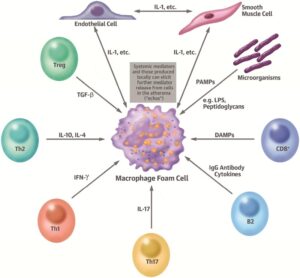Inflammation, Immunity, and Infection in Atherothrombosis: JACC Review Topic of the Week
Kristen Sparrow • June 04, 2020


Inflammation, Immunity, and Infection in Atherothrombosis: JACC Review Topic of the Week
Abstract
Observations on human and experimental atherosclerosis, biomarker studies, and now a large-scale clinical trial support the operation of immune and inflammatory pathways in this disease. The factors that incite innate and adaptive immune responses implicated in atherogenesis and in lesion complication include traditional risk factors such as protein and lipid components of native and modified low-density lipoprotein (LDL), angiotensin II, smoking, visceral adipose tissue, and dysmetabolism. Infectious processes and products of the endogenous microbiome might also modulate atherosclerosis and its complications either directly or indirectly by eliciting local and systemic responses that potentiate disease expression. Trials with antibiotics have not reduced recurrent cardiovascular events, nor have vaccination strategies yet achieved clinical translation. Yet, anti-inflammatory interventions such as anti-cytokine therapy and colchicine have begun to demonstrate efficacy in this regard. Thus, inflammatory and immune mechanisms can link traditional and emerging risk factors to atherosclerosis, and offer novel avenues for intervention.

